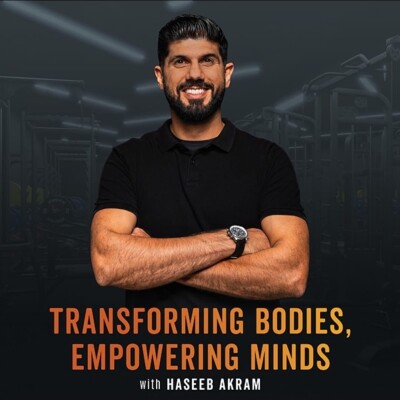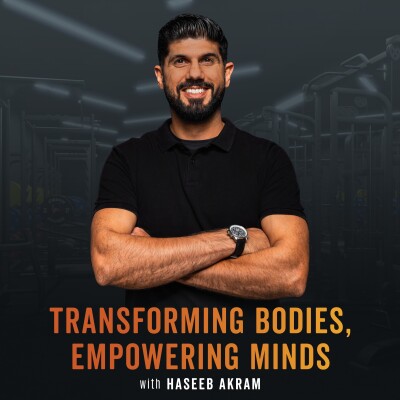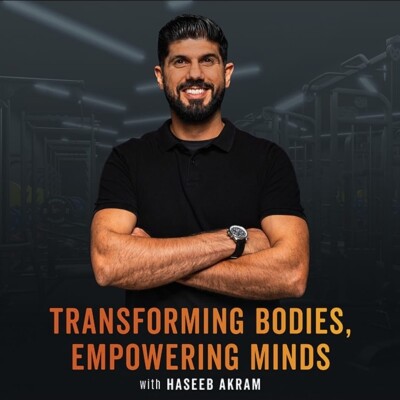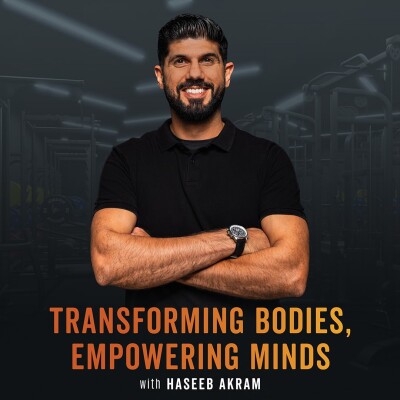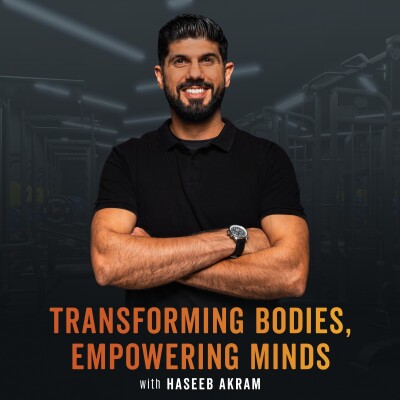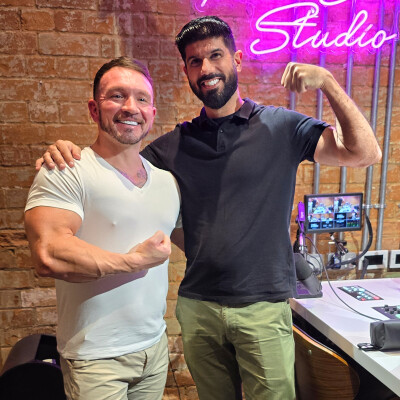Speaker #0Welcome to Transforming Bodies Empowered Minds, the podcast where we dive deep into the world of high-intensity training, nutrition and mindset to help you achieve your fitness goals. I'm your host, Haseeb Akram, and today we're tackling a topic that's absolutely crucial for anyone serious about their fitness journey, nutritional fundamentals. Now, I know what some of you might be thinking. I've heard it all before. eat your veggies, drink your water, blah, blah, blah. But stick with me because I promise you, by the end of this episode, you'll have a whole new perspective on how what you put in your mouth affects what you can do in the gym. The power of proper nutrition. Let's kick things off with a story that highlights the importance of balance, training and nutrition. Pretty much every time I go to the gym, I see this one guy. Let's call him Dave. I recently started speaking with Dave, who told me he was facing a common challenge many fitness enthusiasts encounter. Dave was a proper gym junkie. He was lifting weights five days a week like his life depended on it. But despite all his effort and dedication, Dave wasn't seeing the results he wanted. During our conversation, he said he was frustrated by his lack of progress. I offered Dave a free consultation and during our conversation, I learned that Dave's training regimen was intense but potentially counterproductive. I explained that high intensity training could be more effective than his current approach, allowing for better recovery and muscle growth with fewer sessions per week. But as we dive deeper, the discussion naturally shifted to Dave's diet. It became apparent that he had fallen into the common misconception believing that a protein-centric diet was the key to muscle growth. Dave's meals consisted primarily of protein. Dave's meals consisted primarily of protein shakes and chickens, severely limiting his nutritional intake. Recognizing the need for a more comprehensive approach, we developed a well-rounded nutrition plan that would support his training goals. I emphasize the importance of a balanced diet, including adequate carbohydrates for energy, healthy fats for hormone production, and a variety of micronutrients to support overall health and recovery. This is why we're dedicating an entire episode to nutrition, because you can train like a beast, but if you're not fueling your body properly, you're fighting an uphill battle. The three musketeers of macronutrients. Now, let's dive into the nitty gritty of nutrition. We're going to start with the big three, proteins, carbohydrates. and fats. These are your macronutrients and they're the foundation of any solid nutrition plan. First up, we have protein. If macronutrients were a boy band, protein would be the heartthrob. It's the one everyone talks about, the one that gets all the attention. And for good reason. Proteins are the building blocks of muscle. When you're lifting weights, especially with the intensity we advocate in HIIT, you're creating tiny tears in your muscle fibers. Protein helps repair these tears. making your muscles stronger and bigger in the process. But here's the thing, you don't need to be chugging protein shakes like they're going out of fashion. The key is to get enough protein throughout the day from a variety of sources. Lean meats, fish, eggs and legumes are all excellent choices. And for my vegan friends out there, don't worry, you can absolutely get enough protein on a plant-based diet. Tofu, pulses, nuts and seeds are all protein powerhouses. Now, here's a pro tip. Spread that protein intake. throughout the day. Your body can only process so much protein at once so having a bit with each meal is more effective than trying to cram it all in at dinner time. You only need between 1.2 to 2 grams of protein per kilogram of body weight per day. Recommended amounts vary depending on which study you read but I found that this range works well for most people. You only need between 1.2 to 2 grams of protein per kilogram of body weight per day. Recommended amounts vary depending on which study you read but I found that this range works well for most people. this range works well for most people. Next up we have carbohydrates. Now carbs have gotten a bit of a bad rap in recent years with all sorts of low carb diets popping up but if you're doing high intensity training carbs are your best friend. Carbohydrates are your body's preferred source of energy. When you eat carbs your body breaks them down into glucose which is then stored in your muscles and liver as glycogen. During high intensity exercise your body relies heavily on these glycogen stores for energy but Not all carbs are created equal. We want to focus on complex carbohydrates, things like whole grains, fruits, and vegetables. These provide a steady release of energy, keeping you fueled throughout your workout and beyond. Simple carbs, on the other hand, like those found in sugary snacks and drinks, can cause rapid spikes and crashes in your blood sugar. That's not what we want when we're trying to push through a tough HIIT session. Now, here's something interesting about carbs and HIIT. Because high-intensity training relies heavily on your glycogen stores, You might find that you perform better with a slightly higher carb intake on training days. This is where the concept of carb cycling comes in, eating more carbs on training days and fewer on rest days. It's not necessary for everyone, but some people find it helps optimize their performance and recovery. Something I've noticed with my own body is that I need to consume way more carbs the day before I work out, which seems to give me the energy I need to train effectively. Last, but certainly not least, we have fats. Now I know what you're thinking. Fats. aren't most bad for you? Well it's time to change that mindset. Fats are absolutely crucial for your body. They help with hormone production, nutrient absorption and even brain function. Plus they're a great source of long-lasting energy. But again not all fats are created equal. We want to focus on unsaturated fats. Things like avocados, nuts, seeds and oily fish. These are the fats that can actually help improve your cholesterol levels and reduce inflammation in your body. Saturated fats found in things like butter and fatty meats should be consumed in moderation and trans fats often found in processed foods, less to avoid those altogether. Now here's something important to remember about fats and HIIT. While fats are essential for overall health, they're not the best source of quick energy for high intensity exercise. That's why we typically recommend eating your fats further away from your workout times. They can provide sustained energy throughout the day but right before a HIIT session you want to focus more on easily digestible carbs and proteins. Now we've covered the macronutrients, let's talk about their smaller but equally important cousins, the micronutrients. These are your vitamins and minerals, and they play a crucial role in everything from energy production to muscle function. Here's where fruits and vegetables really shine. They're packed with vitamins, minerals, and antioxidants that can help reduce inflammation, speed up recovery, and even improve your performance in the gym. Now, I know that not everyone is a fan of vegetables, but trust me, your body will thank you for including them in your diet. And if you're really struggling, there are plenty of ways to sneak them into your meals. Throw some spinach into your smoothie or grate some carrots onto your bolognese sauce. Your taste buds might not even notice, but your body certainly will. Here's a great tip. Eat a rainbow. I'm not talking about those rainbow colored sweets in a red packet. Different colored fruits and vegetables often contain different micronutrients. So by eating a variety of colors you're more likely to cover all your bases. Red tomatoes, orange carrots, green spirits, blueberries, you get the idea. Right let's talk about something that often gets overlooked when we discuss nutrition, hydration. Water might not be a nutrient in the traditional sense but it's absolutely crucial for your performance and recovery. When you're doing high intensity training you're going to sweat quite a lot and with that sweat you're losing not just water but also important electrolytes. If you don't replace these, you're setting yourself up for decreased performance, increased fatigue, and potentially even muscle cramps. So how much water do you need? Well, the old advice of 8 glasses a day is a good starting point but if you're training hard you'll likely need more. But don't wait until you feel thirsty to drink. By the time you feel thirst, you're already mildly dehydrated. Try to sip water throughout the day and make sure you're well hydrated before you start your workout. Now here's something interesting about hydration and HIIT. Because of the intense nature of the training, you might actually need to practice drinking during your workouts. It's not always easy to gulp down water when you're gasping for air, so start by taking small sips during your rest periods. Over time, you'll get better at staying hydrated during your sessions. Now, we've talked about what to eat, but let's discuss when to eat. Timing your meals around your workouts can make a big difference in your performance and recovery. Before your workout, you want to focus on easily digestible carbs for quick energy and a moderate amount of protein. A banana with some peanut butter or a small bowl of oatmeal with berries are great options. Aim to eat this about two hours before your workout. If you're eating closer to your workout, say 30 to 60 minutes before, opt for a smaller snack that's lower in fat and fiber to prevent gastrointestinal discomfort. I'm one of these people that doesn't eat anything before I work out because I usually train first thing in the morning, so I take an all-natural whole food liquid energy supplement which works great for me. For most HIIT sessions lasting less than 60 minutes water is sufficient. However for longer or particularly intense sessions consider a sports drink with electrolytes and carbohydrates. I like to make my own drink which is made up of lots of honey dissolved in water with a pinch of Himalayan salt. After your workout is when your body is primed to absorb nutrients. This is the time to get in some high quality protein to help with muscle repair and some carbs to replenish your glycogen stores. A protein shake with a piece of fruit or a chicken breast with sweet potato or excellent choices. Try to eat within 60 minutes after your workout for optimal recovery. The key here is to combine protein for muscle repair with carbs for glycogen replenishment. Don't forget to rehydrate as well. Now... I want to address something that I see all too often. Extreme diets. You know the ones I'm talking about. The all-protein diets, the no-carb diets, the only-eat-between-2pm-4pm diets. Look, I get it. We all want results and we want them fast, but these extreme approaches are rarely sustainable and they can actually hinder your progress in the long run. The key to a successful nutrition plan is balance. You need a mix of all the macronutrients we've discussed along with a variety of fruits and vegetables for those all-important micronutrients. This balanced approach will not only fuel your workouts but also support your overall health. And here's another important point. Don't be afraid of calories. If you're training hard, especially with high-intensity training, your body needs fuel. Drastically cutting calories might lead to short-term weight loss but it can also lead to muscle loss, decreased performance and a whole host of other issues. Instead, focus on the quality of your calories. Choose nutrient-dense foods that will nourish your body and support your training. And remember, if you're looking to change your body composition, it's a marathon, not a sprint. Slow, sustainable changes are always better than quick fixes. I hope you're enjoying this episode of Transforming Bodies, Empowering Minds. If what you've heard today resonates with you and you're looking for more insights or a way to get started, I may have just the thing for you. I've developed an eight-week high-intensity training program that transforms both body and mind. It's a personalized approach working one-on-one with me. The program includes a tailored training plan, nutrition advice from our experts, and effective mindset techniques. You'll be a member of a private group where you'll be able to share your progress, post meal photos, and stream or record and upload your workout videos which I review and provide feedback on. I've previously even joined some of my clients in the gym for hands-on sessions. while on my travels. During the program we'll use technology like smart scales to track your progress and continually make adjustments based on your performance. The program extends beyond strength building to mental transformation. As my clients master the principles of HIIT they often experience a shift in outlook questioning their limits and breaking through mental barriers of fear uncertainty and doubt. Jerome a recent client of mine approached me as he was considerably underweight. He wasn't happy with the way he looked and he was uninterested in food, struggling to keep up his daily calorie intake. He'd recently joined a gym but he wasn't seeing any progress. The one thing that Jerome definitely had on his side though was his determination. He wanted to change his body and eating habits. Through the personalised 8 week programme working with nutritionists, we gradually increased his daily caloric intake focusing on nutrient dense foods. I started Jerome on a progressive high-intensity training program which we adapted along the way. By week 8, Jerome had gained 7kg of lean muscle mass and he was finally at his ideal weight. More importantly, his relationship with food transformed. He now enjoys meal planning and preparation, viewing food as a fuel for his fitness goals rather than a chore. I'm very selective about which clients can join the program as I want to work with only genuinely motivated people. who want to transform their bodies and their minds. If you're truly ready to take the next step, you can book a free, no-obligation consultation using the link in the show notes. Just enter a few basic details and we'll talk about your goals to see if the program is the right fit for you. My aim is to help as many people as possible discover their true physical and mental capabilities. It's not just about getting fit. It's about reshaping your approach to challenges in all areas of life. Now. Back to the episode. Right, so we've covered a lot of ground here, but I know that sometimes all this information can feel a little bit overwhelming. So let's break it down into some practical tips that you can start implementing straight away. First, take some time at the beginning of each week to plan out your meals. This can help you ensure you're getting a good balance of nutrients and can prevent you from reaching for unhealthy options when you're tired or pressed for time. Second, if you can, try to do some meal prep. in advance. Having healthy meals ready to go can be a lifesaver on busy days. Third, keep healthy snacks on hand. Stock up on things like nuts, fruits and Greek yogurt. These can be great for quick nutritious snacks between meals. Fourth, start paying attention to food labels. Look at the macronutrient breakdown and the ingredients list. You'll be surprised at what you find in some of your regular foods. Fifth, stay hydrated. Keep a water bottle with you and sip throughout the day. If you struggle with plain water, try adding some slices of lemon or cucumber for a touch of flavour. Sixth, eat the rainbow. Try to include a variety of colourful fruits and vegetables in your diet. Different colours often indicate different nutrients, so a colourful plate is usually a nutritious plate. Seventh, don't fear carbs. Remember... They're not the enemy, especially if you're doing high intensity training. Just focus on complex carbs from whole fruit sources. And eighth, listen to your body. Pay attention to how different foods make you feel. Everyone's body is different. And what works for me might not work for you. Now, before we wrap up, I want to touch on something that's just as important as the food you eat. Your mindset around nutrition. Too often I see people approach nutrition with the mindset of restriction and deprivation. They see it as a necessary evil, something they have to endure to reach their fitness goals. But here's the thing. Nutrition isn't about punishment. It's about nourishment. It's about giving your body what it needs to perform at its best to recover effectively and to support your overall health and well-being. So I want you to try and shift your mindset. Instead of thinking about what you can't eat, think about all the delicious, nutritious foods you can eat. Instead of seeing your post-workout meal as a chore, See it as an opportunity to refuel your body after a job well done. And remember, perfection is not the goal here. The occasional treat or indulgence is not going to derail your progress. In fact, being too restrictive can often lead to binge eating and a negative relationship with food. The goal is to develop a sustainable, enjoyable approach to nutrition that supports your fitness goals and your overall health. It's about making choices that make you feel good, both in the moment and in the long term. We've covered a lot of ground today, from the basics of macronutrients to the importance of hydration and meal timing. But if there's one thing I want you to take away from this episode, it's this. Nutrition is not just about fueling your workouts, it's about nourishing your body, supporting your recovery and optimising your overall health. Remember our friend Dave from the beginning of the episode? Well, after we sorted out his nutrition, his progress in the gym skyrocketed. He was lifting heavier, recovering faster. and feeling better overall. And the best part? He actually enjoyed his new way of eating. That's what I want for all of you. I want you to see nutrition not as a necessary evil, but as a powerful tool in your fitness arsenal. Because when you combine proper nutrition with high intensity training, that's when the magic really happens. So here's your homework for this week. Take a look at your current diet. Are you getting a good balance of carbs, proteins and fats? Are you including a variety of fruits and vegetables? Are you staying hydrated? If not, pick one area to focus on improving this week. And remember, small, consistent changes are the key to a long-term success. You don't have to overhaul your entire diet overnight. Start small, be consistent, and trust the process. Focus on fueling your body right. You can't out-train a bad diet. As we wrap up this episode on nutritional fundamentals for fitness success, it's important to remember that nutrition is a journey, not a destination. It's about making informed choices that support your goals and enhance your quality of life. One of the most important aspects of a successful nutrition plan is flexibility. Life happens. There will be days when you can't stick to your plan perfectly. And that's okay. The key is to stay committed over the long term and not let minor setbacks derail your progress. Finally, don't forget to celebrate your wins along the way. Whether it's hitting a new personal best in the gym, or simply feeling more energized throughout the day. Take time to acknowledge and appreciate your success. and appreciate your progress. Before we wrap up today's episode, I want to thank you for joining me on this journey. I'm just getting started, so please show your support by liking, subscribing, and sharing it with others who might benefit so you don't miss out on any of the valuable content coming your way. Your support encourages me to create more, which in turn I hope will inspire and empower you. Join me for future episodes where we'll dive deeper into specific HIIT techniques, nutrition strategies, success stories, and interviews with experts. And if there's a topic you'd like me to cover in an upcoming episode, let me know in the comments. Thank you again for joining me on this episode about better health and fitness through smarter nutrition choices. Until next time, keep pushing, keep learning, keep transforming.
